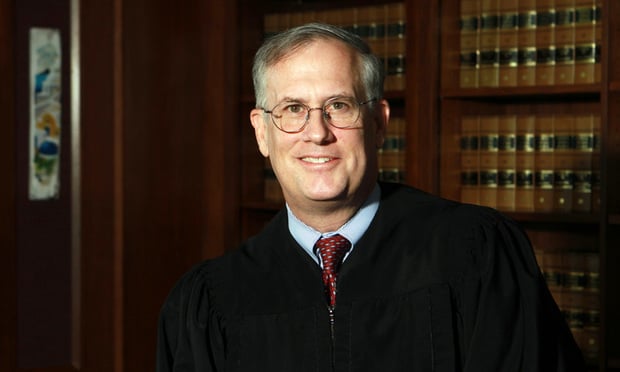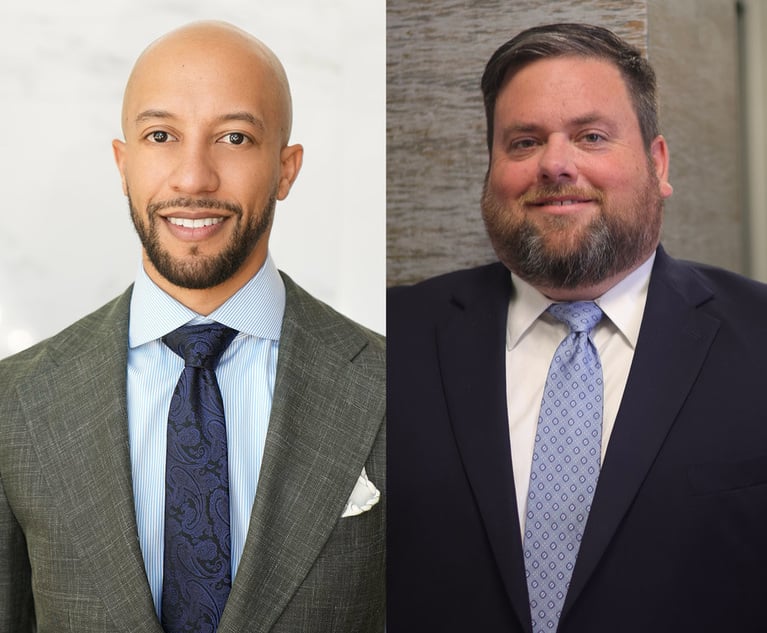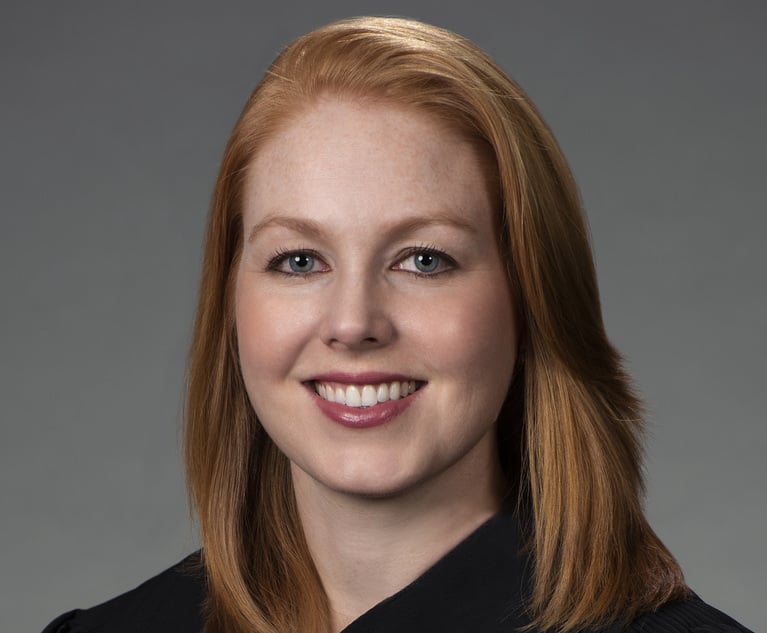Questions for the Bench: Chief Judge George Hutchinson of Gwinnett Superior Court
"Having the legal knowledge is really just the starting point. Developing strategies for dealing with people, managing the cases and the courtroom is really the art of the job."
September 19, 2019 at 11:14 AM
6 minute read
 Chief Judge George Hutchinson, Gwinnett County Superior Court. (Photo: John Disney/ALM)
Chief Judge George Hutchinson, Gwinnett County Superior Court. (Photo: John Disney/ALM)
Chief Judge George F. Hutchinson III of the Gwinnett County Superior Court was appointed to the court by Gov. Nathan Deal in 2013 after a nine-year stint as a magistrate judge, including six years as chief. He served as an assistant district attorney for 15 years, first in the Coweta Judicial Circuit and then in Gwinnett.
Hutchinson, who graduated from Guilford College in 1986 and Emory University School of Law in 1989, agreed to answer the Daily Report's questions.
When did you first start thinking of becoming a lawyer?
I first formed the idea of going to law school in college. I majored in administration of justice and knew I wanted to go into public service, but initially I thought that would likely be in some law enforcement capacity. As time passed, the court process itself really became my primary interest, and I began to focus on the idea of going to law school.
You worked as a prosecutor for 15 years, from law school till 2004. What was the hardest part of that job, and what was the most rewarding part?
I'd say those tough conversations with victims about the weaknesses of a case, particularly when the charges or the injury were serious. The evidence against the defendant might not have been strong or the equities of the situation simply dictate that the case should be resolved in some way other than what the victim would have preferred. Sometimes the right thing for a prosecutor to do is to choose not to prosecute at all. Those were tough conversations, but having that honest conversation was the right thing to do in each of those cases, both for them as well as the system.
The most rewarding part was to see the process work as intended. Seeing attorneys try cases well and demonstrate mastery of the courtroom. It's important to occasionally pause and think about the level of trust that people have in the justice system and its ability to resolve disputes in a just way.
What prompted you to seek a job as a judge?
Over the years, I have had the opportunity to appear in front of a lot of really terrific judges. Men and women who I respected not only for their legal skills but for the people skills they demonstrated that are such a big part of being a good judge. I wanted the opportunity to do that and be that. I suppose in many ways it also seemed like the next logical career step. I had the opportunity to be involved in a lot of really interesting and challenging cases over my career. The people I have worked for over those years gave me tremendous opportunities, and I wanted to do more.
What have you learned from your years on the bench that you wish you'd known as a prosecutor?
I think true of all new lawyers, not just prosecutors, the world seems very black and white. As time passes, I think we all realize the world is a lot more complex than that. People are neither all one thing or another. Everything is a shade of grey.
Today I try to take a much more nuanced approach to cases and the people involved in them, both as parties and as attorneys. I try to see what may be motivating behavior, whatever the role that person may have in the courtroom.
After practicing in criminal law for so long, what struck you about presiding over civil litigation?
Risking the loss of your freedom is certainly different than risking the loss of some portion of your bank account. The stakes are certainly different, but that does not imply that civil cases are somehow less important. Often, criminal cases are more urgent in the sense that resolving the question of someone's freedom requires immediate attention.
The lawyering is different in that the attorneys that practice criminal law generally have more of a history with each other and an expectation that they will have future cases together. Criminal attorneys normally have a relationship with each other, and they seem more comfortable operating based on a handshake or a commitment made in the hallway before court begins.
Although there are exceptions, that's not been my experience in civil litigation. Where those trust relationships don't exist, attorneys, perhaps rightfully so, tend to protect themselves and their clients with formal motions, emails and letters documenting conversations, consent orders and all manner of other documentation. It's really a more cautious—less trusting approach to dealing with other side.
What keeps you up at night regarding your work?
Someone or some case getting overlooked or lost in the system. We try to have redundant systems and trust that there are several different people and several entities making sure everything is attended to correctly. No system is perfect. We are always looking to improve it and eliminate gaps wherever we can.
What habits would you like to see lawyers who appear before you change?
Be nice. Be professional. Approach cases from the perspective of resolving disputes. The attorney on the other side of that case is your colleague and a fellow member of the bar. Remember that being adversaries in an adversarial system does not imply that there needs to be personal animosity.
You've completed courses and taught courses in judicial education. What do judges want to learn in these programs?
No one knows everything there is to know in the law, not even judges. As judges, we need to know as much as we can, stay up with current developments and be willing to pause and find the answers when an issue comes up that we have not seen before. However, having the legal knowledge is really just the starting point. Developing strategies for dealing with people, managing the cases and the courtroom is really the art of the job.
This content has been archived. It is available through our partners, LexisNexis® and Bloomberg Law.
To view this content, please continue to their sites.
Not a Lexis Subscriber?
Subscribe Now
Not a Bloomberg Law Subscriber?
Subscribe Now
NOT FOR REPRINT
© 2025 ALM Global, LLC, All Rights Reserved. Request academic re-use from www.copyright.com. All other uses, submit a request to [email protected]. For more information visit Asset & Logo Licensing.
You Might Like
View All
Trial Court Had No Authority to Reopen Voir Dire After Jury Impaneled in Civil Case, State Appellate Court Rules

'Pushed Into Oncoming Traffic': $5.85M Settlement in Mediated Auto Tort
6 minute read
Justice Known for Asking 'Tough Questions' Resolves to Improve Civility
4 minute readTrending Stories
Who Got The Work
J. Brugh Lower of Gibbons has entered an appearance for industrial equipment supplier Devco Corporation in a pending trademark infringement lawsuit. The suit, accusing the defendant of selling knock-off Graco products, was filed Dec. 18 in New Jersey District Court by Rivkin Radler on behalf of Graco Inc. and Graco Minnesota. The case, assigned to U.S. District Judge Zahid N. Quraishi, is 3:24-cv-11294, Graco Inc. et al v. Devco Corporation.
Who Got The Work
Rebecca Maller-Stein and Kent A. Yalowitz of Arnold & Porter Kaye Scholer have entered their appearances for Hanaco Venture Capital and its executives, Lior Prosor and David Frankel, in a pending securities lawsuit. The action, filed on Dec. 24 in New York Southern District Court by Zell, Aron & Co. on behalf of Goldeneye Advisors, accuses the defendants of negligently and fraudulently managing the plaintiff's $1 million investment. The case, assigned to U.S. District Judge Vernon S. Broderick, is 1:24-cv-09918, Goldeneye Advisors, LLC v. Hanaco Venture Capital, Ltd. et al.
Who Got The Work
Attorneys from A&O Shearman has stepped in as defense counsel for Toronto-Dominion Bank and other defendants in a pending securities class action. The suit, filed Dec. 11 in New York Southern District Court by Bleichmar Fonti & Auld, accuses the defendants of concealing the bank's 'pervasive' deficiencies in regards to its compliance with the Bank Secrecy Act and the quality of its anti-money laundering controls. The case, assigned to U.S. District Judge Arun Subramanian, is 1:24-cv-09445, Gonzalez v. The Toronto-Dominion Bank et al.
Who Got The Work
Crown Castle International, a Pennsylvania company providing shared communications infrastructure, has turned to Luke D. Wolf of Gordon Rees Scully Mansukhani to fend off a pending breach-of-contract lawsuit. The court action, filed Nov. 25 in Michigan Eastern District Court by Hooper Hathaway PC on behalf of The Town Residences LLC, accuses Crown Castle of failing to transfer approximately $30,000 in utility payments from T-Mobile in breach of a roof-top lease and assignment agreement. The case, assigned to U.S. District Judge Susan K. Declercq, is 2:24-cv-13131, The Town Residences LLC v. T-Mobile US, Inc. et al.
Who Got The Work
Wilfred P. Coronato and Daniel M. Schwartz of McCarter & English have stepped in as defense counsel to Electrolux Home Products Inc. in a pending product liability lawsuit. The court action, filed Nov. 26 in New York Eastern District Court by Poulos Lopiccolo PC and Nagel Rice LLP on behalf of David Stern, alleges that the defendant's refrigerators’ drawers and shelving repeatedly break and fall apart within months after purchase. The case, assigned to U.S. District Judge Joan M. Azrack, is 2:24-cv-08204, Stern v. Electrolux Home Products, Inc.
Featured Firms
Law Offices of Gary Martin Hays & Associates, P.C.
(470) 294-1674
Law Offices of Mark E. Salomone
(857) 444-6468
Smith & Hassler
(713) 739-1250







